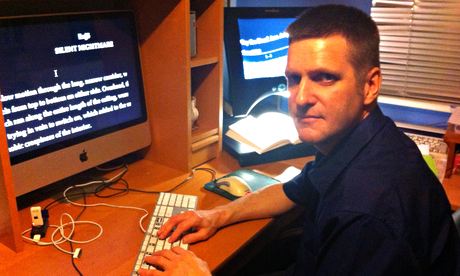
Nick Sturley still recalls the train journey home from a hospital visit in London when he was 10 years old. His mother sat opposite him, reassuring him that she was fine, but even at that age he was a master at reading visual cues, and he could tell that something was wrong.
At the hospital, Sturley had been given eye drops and a range of tests. Afterwards, he sat in an office while his mother talked to the doctor. Being deaf, he had no idea what they were saying, and it was only later, through letters between home and his boarding school, that his mother explained that he had "tunnel vision". He says that when he was "diagnosed as profoundly deaf when I was 10 months old [it] was a bad enough shock for my parents, but to be told I would also go blind was devastating".
Sturley had been diagnosed with Usher syndrome, a genetic condition that affects hearing, vision and balance. Usually, the hearing loss is there from birth. The discovery of a gradual reduction in vision – people notice that they are finding it harder to see at night and that their peripheral vision is narrowing – often comes much later.
There is a debate that most people who are deaf or blind encounter at some stage – which is easier to deal with? For many who already have one condition, it is unthinkable to have both. Sturley's sight decreased through his 20s, and he says his lowest point was a period of loneliness in the summer of 1999. He could barely see, and found himself alone in his flat while his friends were away. "I drank and smoked quite a lot and was very depressed." But the growth of the internet helped him out of his "dark hole" and he set up UsherLife, which connects people with Ushers, in the virtual and real world.
Despite being forced to give up a full-time media career at 31, Sturley knew that he "wasn't the sort who would sit in front of the telly all day". He uses screen magnification on his computer: he has written three pantomimes starring deaf actors, two novels, and written and directed two sign-language films.
He now communicates using hands-on British Sign Language (BSL), feeling the signs people are making with his hands. He says that one of his biggest frustrations is that he cannot do things spontaneously any more: he needs a communicator guide in order to go out socially. But he has a positive attitude, and says he tries "to sweep it aside and get on with it until the next moment".
Writer Cristina Hartmann, from San Francisco, knew she had Usher from a young age, but while she didn't hide it, she "never talked about it either". Then last year, she "came out" in a blog for an online community. She says the response "was huge and unexpected". She describes it as a weight off her shoulders, but adds: "I didn't want people to define me by a condition I happen to have."
Impulsive by nature, Hartmann explains that having Usher has made her "a more careful and cautious person than I would be otherwise". She makes sure she has a friend with her at parties, and memorises public transport schedules. And while having Usher can make her feel "unsure what is happening around me, which is bewildering and unsettling", it has also made her "learn how to appreciate what I have when I have it ... friends, family, and people who show kindness to me".
For Emma Boswell, the biggest blow after her diagnosis was losing her driving licence. Twenty years on, she still misses driving in the countryside, but says that having Usher has made her "independent and tough". She is married and has two young children. After being diagnosed with cancer two years ago, she decided to help other deaf people with the disease by setting up a support group in London. She is the chair of the International Usher Network and works for the charity Sense.
The support each person with Usher needs is different, she says. Some need help with communication, others with mobility. People with Usher can find their diagnosis "traumatic, devastating, upsetting and distressing ... but many have a good life, some go to college and university, travel, have good jobs and have children, adjusting to their needs as their sight deteriorates".
While diagnosis can be deeply distressing, it can also give people the opportunity to seek new goals: 36-year-old James Clarke aims to run 100 races and has done 59 so far.
"Accept the way you are. Be true," reads an anonymous poem by a Manchester artist/photographer with Usher. The poem explains how people with Usher see the world through a different lens: "My fingers are my eyes, my hands are my ears," the opening lines say. "I create my sense of space with my mind."

